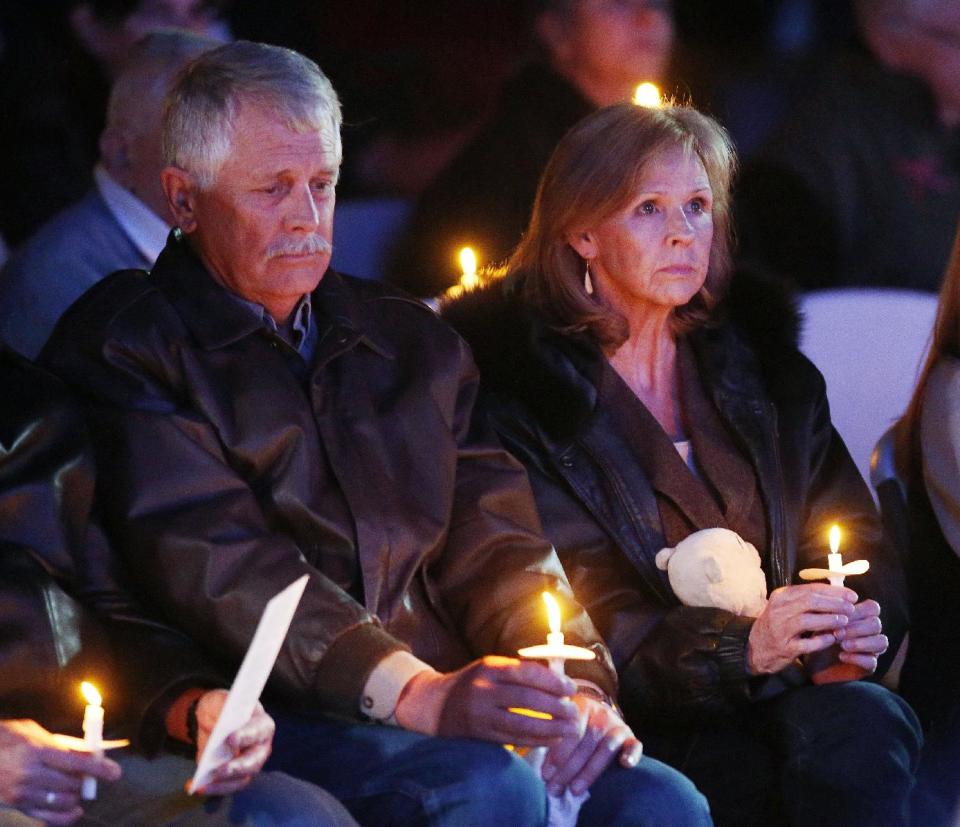Family of murdered ISIS hostage Kayla Mueller speaks out

In a statement honoring American hostage Kayla Mueller on the anniversary of her death in Syria, her family suggests they are preparing to go public with “the heartbreaking story” of their attempts to ransom her from the Islamic State. And, they say, they will be speaking out about “those who hindered us” — an apparent reference to their frustration with officials in the Obama administration over how their daughter’s case was handled.
The statement by Marsha and Carl Mueller, Kayla’s brother Eric and other family members and friends is the first they have made since shortly after receiving confirmation last February of the death of the 26-year-old humanitarian worker from Prescott, Ariz., who was killed in Syria after being held captive by the Islamic State for nearly two years.
U.S. officials have confirmed that Mueller was tortured by her Islamic State captors — and, according to debriefings of some who were held with her — even taken as a “wife” and sexually abused by the terror group’s leader, Abu Bakr al-Baghdadi. But much remains unknown about what happened during her horrifying ordeal: Although the family has received photos of her body, it has not been recovered and the way she died, whether murdered by her captors or killed by a coalition bombing, remains unclear.
The new statement, along with a newly released photograph of Kayla with her parents taken just months before she was kidnapped in 2013, invokes the memory of a young woman who, in volunteering to help refugees from the Syrian civil war, was committed “to serving the most vulnerable.”
“Kayla was given a special heart and mind to not only see suffering in its many forms but to reach out and find a way to help those God placed before her,” reads the statement, released by a spokeswoman for Atlantic Media, the company owned by businessman David Bradley, who attempted to assist the families of Mueller and other American hostages who were being held by the Islamic State.

But it strongly hints that the family will have more to say, especially about the actions of the Obama administration and the dispute about whether the families should have been permitted to pay ransom in an attempt to save their loved ones.
“The heartbreaking story of our efforts to bring Kayla home and of those who helped and those who hindered us will be told,” the family’s statement reads.
As has been recounted in multiple media accounts, the Muellers as well as other families of American hostages — including that of James Foley and Steven Sotloff, both of whom were beheaded in grisly videos released by the Islamic State — ran afoul of administration policies that effectively prohibited them from negotiating a ransom with the captors.
While the FBI over the years has often quietly assisted families interested in paying ransom, other agencies of the government — especially at the Treasury and the State Department — took a hard line, asserting that any such payments would only encourage further hostage-taking and even violate U.S. laws against providing “material support” to terror groups.
At a tense White House meeting, one counter-terrorism official issued what the families took as a threat that they could be criminally prosecuted if they made such payments. After the families of Foley and Sotloff went public with the threat, the White House began a review that led to a new hostage policy last year. While not explicitly condoning ransom payments, the new stance is that the government will not prevent families from “communications with hostage takers” — a formulation that seemed to open the door to paying ransom in some circumstances. (Obama also made clear that official threats to families that they might be prosecuted were “totally unacceptable.")
But the Muellers’ anguish over the handling of their case seems to go beyond that and could become politically awkward for the White House. In the one interview they have given so far to NBC News, shortly after their daughter was confirmed killed, members of Mueller’s family confirmed that the family had been in communication with her Islamic State captors, and they were seeking to raise a demanded ransom of $6.2 million. But, they said, the talks fell apart after the White House agreed in 2014 to trade American soldier Bowe Berghdahl in exchange for five Taliban detainees being held at the U.S. detention facility in Guantanamo.
“That made the whole situation worse,” Eric Mueller, Kayla’s brother said. “Because that’s when the demands got greater. They got larger. They realized that they had something. They realized that, ‘Well, if they’re gonna let five people go for one person, why won’t they do ths? Or why won’t they do that.”
Sources who have talked to the Muellers say they are still frustrated about the lack of information they have received from the U.S. government about her treatment — and what happened to her.

A spokeswoman for the White House did not respond to a request for comment.
One of the key figures who could unravel lingering questions is Umm Sayyaf, the wife of the Islamic State official in charge of oil and gas money, Abu Sayyaf, who was killed in a Delta Force raid last May. In the raid, Delta Force commandos captured Umm Sayyaf. During debriefings, she is believed to have confirmed accounts from other rescued Yazidi captives, that Mueller had been sexually abused by al-Baghdadi.
But another former U.S. intelligence official familiar with the debriefings said Umm Sayyaf was more responsible than anybody else for the mistreatment of Mueller, saying she was in charge of female captives and participated in “horrific” torture and beatings. Umm Sayyaf is now in Kurdish custody, and when the former official recently inquired about her current status, he was told that “others” — an apparent reference to the U.S. government — had an interest in possibly putting her on trial in the United States.
A spokeswoman for the Justice Department declined comment.




